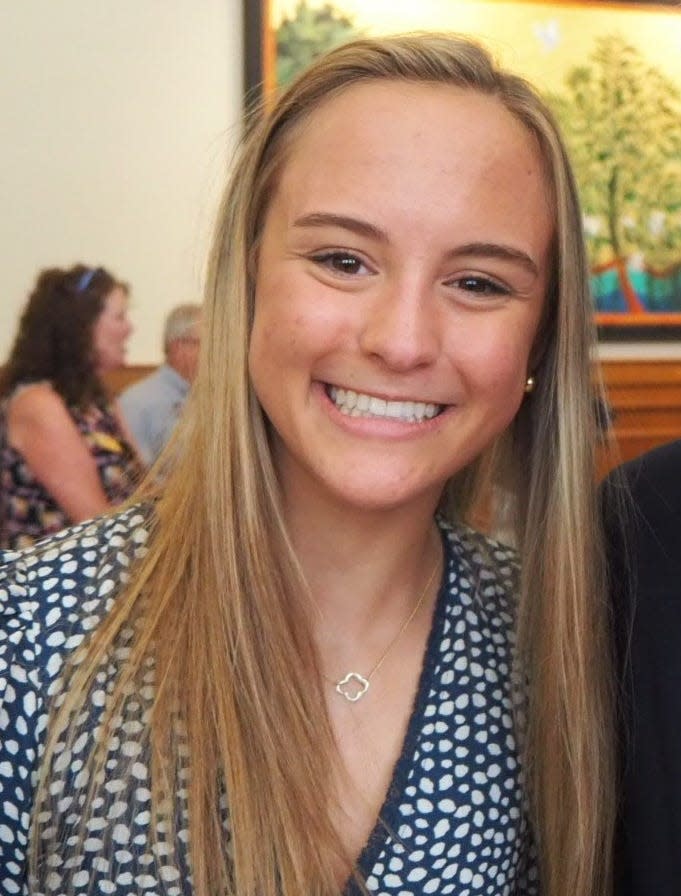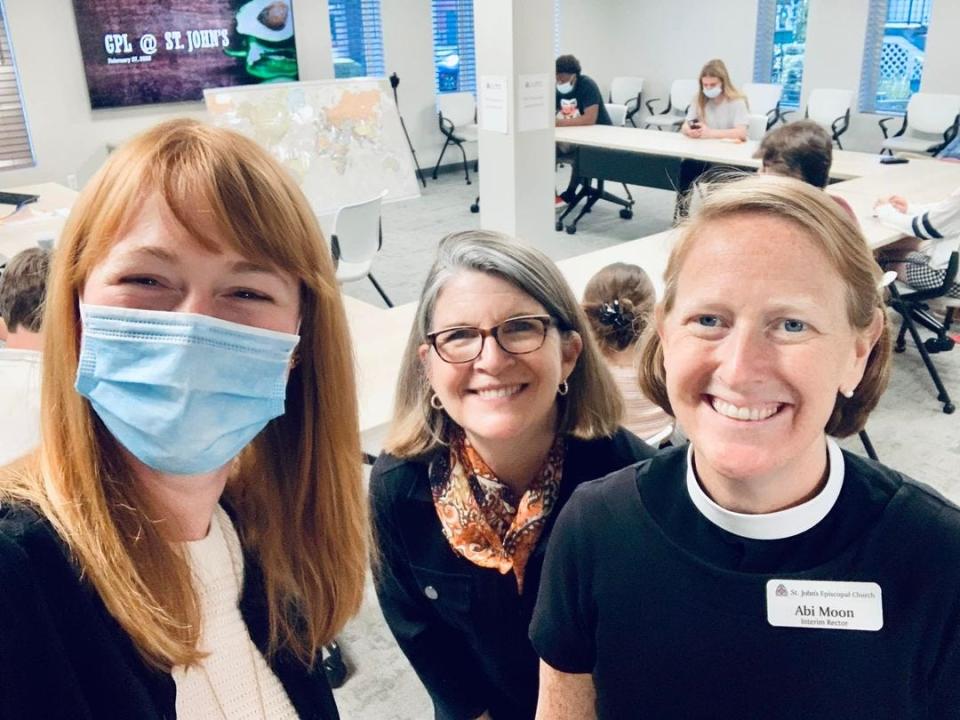Innovative St. John's program teaches teens money skills for the greater good
Every parent wants their children to become responsible money-handlers.
To teach these values, parents may pay little allowances for chores done or encourage children to put pennies in a Salvation Army kettle, or even open a small savings account into which the child begins to contribute.
Library programs: Leon County Library jumps into 'Oceans' for summer reading programs
Saving on supplies: Find your frugal: Six tips to save on hurricane preparedness expenses
Student art: School's out and art's in: 'Wiggles, Slithers, and Flies' showcases student work
By the time a young person is in high school, academics, sports, clubs and extracurriculars have likely eaten up any time — or even interest — a high-schooler had to devote to becoming “financially literate.” And yet, so very much hinges on that student’s understanding of how money works, how it can help, hinder, destroy, and undergird every aspect of their lives.
But what to do?

Enter Kate Kile. Kile is the Director of Finance and Stewardship at St. John’s Episcopal Church. She is 51 years old, the mother of three children — the youngest of whom is a freshman at Leon High School — and it is fair to say that she is “stoked.”
Young people can have impact
You may call her “enthusiastic and inspired,” but certainly Kile’s stated mission for the last two years has been to demonstrate to high school students that at the intersection of altruism, economic savvy, historical foundation, and financial process, a person not yet out of their teens can have an impact on individuals living across the globe.
Kile’s is a belief that youth have the ability to evaluate competing theories and make wise decisions about money when given the information and the tools to do so.
And thus, in the middle of a pandemic, came into being at St. John’s Episcopal Church, the Global Philanthropic Leaders program.
Through the GPL program, young people are entrusted with church funds to make micro-loans (through kiva.org) and positively impact people in the U.S. and around the world. The program meets from October through April, and the deadline to apply for the next session at St. John's is June 30.
'These are not gifts'
“In 2020 at an Episcopal convention just before most things went virtual, I heard a lecture on Micro-Loan Philanthropy for High-Schoolers,” says Kile. “It is the brain child of Richard Stein, a lay reader, historian, economist, and active future’s trader. Though I modified his curriculum somewhat, the premise is that young people will learn about investment, markets, diversification, loan risks, as well as the history of poverty and historical inequities," Kile said.
"But most of all, as their financial acumen grows, the high school participants will be given the responsibility — and the freedom — to make investments in people in the form of micro loans. But these are not gifts.”

Rather, according to Kile, these are loans made by the GPL students to recipients who have been researched and vetted by Kiva, a 501c3 organization which to-date has overseen $1.1 billion in micro loans to 85 countries, 96% of which has been repaid.
“This allows our youth to choose to help, for instance, a farmer in Kenya to buy seed, or a minority female entrepreneur in the U.S. to set up her handmade jewelry shop. In each case, money that is made available is a non-interest loan which is expected to be paid back.”
More: NASA offers lesson in learning from failure while celebrating success | McKibben
Each student invests their own money
And where does the loaned money come from?
“Each student is asked to bring $25 of their own money, preferably money he or she has earned themselves. St. John’s then adds another $200 to each participant’s coffer. It is this money that will then be made available as nine separate loans.”
Kile’s commitment to the GPL program sparkles in her voice.
But how did she successfully pitch a once a month, Sunday afternoon meeting about “finance and loan-making” to the 13 students who joined at St. John’s for the first year, and eagerly signed on for year two?
It may be that most of us underestimate what savvy young people want to know.
“For one thing,” says Kile, “we use Scripture and group discussion to consider 'who is our neighbor?' and how we can share God’s abundance by investing in others.”

Learning money management skills
Matthew Harris, who has just graduated from Leon High School, says that he was particularly impressed with the “altruistic” nature of the program. “Even as I was learning, I found I was in the position to help someone else.”
Harris notes that since FSU was looming on his horizon, he also knew that money management, once on one’s own, can contain pitfalls.
“I needed to learn life stuff, organization of bills, how mortgages work, things about investing… I didn’t want to end up blowing off my money. I knew I would learn about managing my personal finances, and that was good,” Harris said.
What he also valued at the end of the year was seeing how the money he had loaned to his personally selected recipients began to return — and how it could then be reinvested in another farmer or business.
Collins Barton, a rising sophomore at Maclay, may have come to the Global Philanthropic Leaders program knowing a bit about economics in advance. “I was already interested in finance, my uncle being a loan officer at a bank. But I knew nothing about how loans actually worked.”

Yet there was more than just making loans that fascinated her.
As with Matthew Harris and the other program members, Collins had been shown a documentary called, Poverty Inc. which detailed the “global charitable market” that disposes of clothing, food, and unwanted goods by “dropping” them in poor nations as charitable donations, but which in the end squelch local enterprise and keep inhabitants perpetually poor.
The GPL students come to learn that investing in people to create their own markets is the healthier solution.

Series explores money history
Over the last two years, leader Kile has turned the program into a kind of “graduate seminar style” series.
Ben Bowersox, a Senior Vice President at Capital City Trust, Stephanie Amidon, a Maclay School teacher of AP Government, J.R. Saginario, an Investment Advisor at Charles Schwab, and Bo Shippen, a Labor Economist consultant have all spoken to the students.
Shippen speaks frankly to the youth in the second year of the program about the “imbalances and structural impediments to financial security from past American injustices—slavery, indentured servitude, and the Jim Crow restrictions and prejudices—and how many of those same barriers remain today in the form of restrictive housing and education policies
Collins Barton, rather than being off-put by such facts, says that “Learning about racial inequality with historically accurate facts and explanations is good. The GPL program, here in the setting of the church, has inspired me. I see how everything is actually connected — our faith, our history, and how the use of money can hinder or help.”
The second year, the students focused their loan-making on United States’ minority-owned businesses.
Third year focus is sustainability
For the third year of the program which begins in October, Kile has turned her attention to a topic that is high on many of the student’s agendas: sustainability.
“The curriculum will focus on Creation Care," Kile said. “Air, water, carbon deposits…. These kids are angry and scared about the future of our earth,” Kile said, and she wants to give them the facts and the tools to invest in change.
Shippen agrees.
“Kids want to understand. They talk among themselves about what they hear on the news, what they see, and they want to know the facts," Shippen said. "With accurate information in hand, it is remarkable to see them rising to the occasion, asking the right questions, deliberating wisely, and investing in the future for themselves and others without creating reliance and dependency.”
To learn more
Application deadline: Sign-up for the next Global Philanthropy Leaders program by June 30 at saint-john.org or contact kate@st-john.org.
First meeting: Oct. 7 at St. John’s Episcopal Church, 211 N. Monroe St.
Statistics for GPL at St. John's
Over the past two years 23 students have contributed a total of $575. Combined with 36 parishioner contributions, totaling $7,920, to invest in 265 borrowers around the world.
Loans made: 265
Total loans: $6,625
Average loan: $25
Number of countries: 39
Contact Marina Brown at mcdb100@comcast.net
Never miss a story: Subscribe to the Tallahassee Democrat using the link at the top of the page.
This article originally appeared on Tallahassee Democrat: St. John's micro-loan program teaches teens altruism, financial skills

